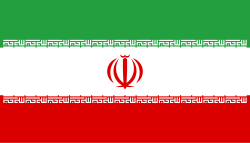| Iran at the 2019 World Aquatics Championships | |
|---|---|
 | |
| FINA code | IRI |
| National federation | Iran Amateur Swimming Federation |
| in Gwangju, South Korea | |
| Competitors | 2 in 1 sport |
| Medals |
|
| World Aquatics Championships appearances | |
Iran competed at the 2019 World Aquatics Championships in Gwangju, South Korea from 12 to 28 July.